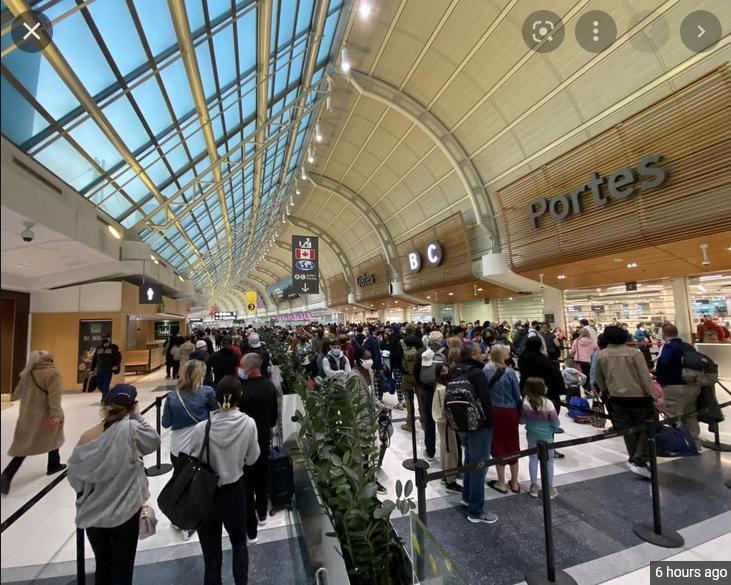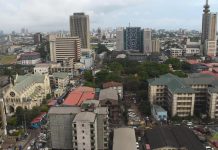
Africa-Press – Gambia. The latest coronavirus news from Canada and around the world Thursday. This file will be updated throughout the day. Web links to longer stories if available.
1:40 p.m. There is nothing like a warm and sunny spring day to relaunch the annual Hike for Hospice, the biggest fundraiser for Hospice Renfrew. This past Sunday the event was all the more special because for the first time since 2019, the hike returned from a two-year hiatus and the energetic walkers and joggers raised an amazing $102,000 with donations continuing to roll in.
The arrival of COVID-19 in March 2020 and the ensuing pandemic that shut down all major events which involved large gatherings, forced the hospice board of directors to cancel the annual fundraiser, a fundraiser which usually raised in excess of $100,000. In its place, a virtual hike was held in both 2020 and 2021 which raised money, but not as much as in previous years.
The cancellation of the hike was especially painful for Hospice Renfrew because not only did the event raise approximately one-fifth of its annual fundraising totals, but the cancellation extended to friends and family of loved ones who were not allowed to visit the facility and spend precious time with them.
1:15 p.m. You might think that, after two long years cooped up inside and scores of news reports about a boom in pandemic pet adoptions, dog licences and complaints about everything from barks to bites would be on the rise in Hamilton.COVID-19 in Ontario
But the numbers tell a different story.
Between 2019 and 2021, the city’s animal services division saw pet adoptions fall year-over-year to 267 from 583, dog bite investigations to 198 from 243 and barking dog complaints to 849 from 1,002. Licence registrations also dropped, to 35,631 in 2021 and 35,450 in 2020 from 40,624 in 2019.
Meanwhile, charges under the city’s animal ownership bylaw — which two years ago was by far the bylaw most frequently broken in Hamilton — plummeted to 655 in 2021 from 1,391 in 2020 and 1,544 in 2019.
What explains the trends?
12:45 p.m. Just days into what was supposed to be the Seattle cruise industry’s comeback from COVID, a cruise ship steamed into Elliott Bay with dozens of passengers infected with the illness.
Tuesday’s arrival of the stricken Carnival Spirit was an inauspicious inaugural for an industry that pumped nearly $1 billion into the state economy before COVID and whose return is seen as key to the revival of downtown Seattle.
Carnival Cruise Line declined to say how many of Spirit’s approximately 3,000 passengers tested positive for COVID.
A Carnival spokesperson said in an email Wednesday said only that the vessel’s crew “managed a number of COVID cases” during the journey from Miami via the Panama Canal.
12 p.m. Quebec is reporting a 57-patient decline in COVID-19 hospitalizations and 18 additional deaths linked to the disease.
The Health Department says 2,119 people are in hospital with COVID-19, after 150 people were admitted and 207 were discharged.
It says 64 people are in intensive care, a decline of 14 from the day before.
Health officials say 1,416 new cases were confirmed with PCR testing and that 11.6 per cent of tests analyzed Wednesday were positive. An additional 329 positive self-tests were reported through a government website.
11:30 a.m. Ontario is reporting 205 people in ICU due to COVID-19 and 1,676 in hospital overall testing positive for COVID-19, according to its latest report released Thursday morning.
Of the people hospitalized, 42.9 per cent were admitted for COVID-19 and 57.1 per cent were admitted for other reasons but have since tested positive. For the ICU numbers, 65.3 per cent were admitted for COVID-19 and 34.8 per cent were admitted for other reasons but have since tested positive.
The numbers represent a 3.0 per cent increase in the ICU COVID-19 count and a 1.3 per cent decrease in hospitalizations overall. 26 per cent of the province’s 2,343 adult ICU beds remain available for new patients.
Read the full story from the Star’s Dorcas Marfo
8:45 a.m. When the COVID-19 pandemic kept Canadians cooped up at home and forced retailers to temporarily shut their doors, Lightspeed Commerce Inc.’s customers had “a moment of high panic.”
About 90 per cent of the Montreal point-of-sale technology company’s clients were physical retailers and restaurants, who had to cobble together websites, online stores and delivery programs seemingly overnight.
Lightspeed, which had offerings that straddled the e-commerce and brick-and-mortar worlds, helped them navigate the transition, but CEO JP Chauvet says that as pandemic restrictions fade and people return to in-store spending, it’s now the company’s “time to shine.”
“It’s safe to say that a post pandemic world is much better for Lightspeed than a pandemic world,” he said.
The 17-year-old company is eager to brand itself as a one-stop shop for businesses as they reopen and get back to in-person experiences, but at the same time, strive to keep and grow their online avenues.
8:25 a.m. The World Health Organization is estimating that nearly 15 million people were killed either by the coronavirus or by its impact on overwhelmed health systems in the past two years, more than double the official death toll of 6 million. Most of the fatalities were in Southeast Asia, Europe and the Americas.
In a report released on Thursday, the U.N. agency’s chief Tedros Adhanom Ghebreyesus described the figure as “sobering,” saying it should prompt countries to invest more in their capacities to quell future health emergencies.
Scientists tasked by WHO with calculating the actual number of COVID-19 deaths between January 2020 and the end of last year estimated there were between 13.3 million and 16.6 million deaths that were either caused directly by the coronavirus or were somehow attributed to the pandemic’s impact on health systems, like people with cancer unable to seek treatment when hospitals were full of COVID patients.
8 a.m. Public health says COVID-19 transmission is decreasing in Hamilton for the first time in the sixth wave.
The assessment is despite hospitalizations increasing, heightened outbreaks in high-risk settings and high COVID spread.
“Hamilton COVID-19 transmission remains elevated, but has started decreasing,” stated the assessment released Wednesday.
It suggested, “Hamilton is beyond the peak” of the sixth wave, which has been driven by the more contagious BA.2 subvariant of Omicron.
The report points specifically to average new cases dropping to 139 on May 1 from 163 on April 24 and 181 on April 18. However, this number has been fluctuating — it was 133 on April 30 and 138 on May 2. It’s also a significant underestimate as the public has not had access to PCR testing since Dec. 31.
7:45 a.m. U.S. Secretary of State Antony Blinken tested positive for COVID-19 and will work from home in the coming days, prompting him to postpone a key China policy speech that had been scheduled for Thursday.
Blinken, who attended the White House Correspondents Association dinner on Saturday, is fully vaccinated and boosted and is experiencing only mild symptoms, according to a statement Wednesday from State Department spokesman Ned Price.
The top U.S. diplomat “has not seen President Biden in person for several days, and the President is not considered a close contact according to guidelines by the Centers for Disease Control and Prevention (CDC),” Price said. “He tested negative on Tuesday and again as recently as this morning.”
7:20 a.m. Outside of southern Africa, new COVID-19 cases on the continent remain low, according to the Africa Centres for Disease Control and Prevention.
South Africa is reporting the most weekly new cases, Africa CDC Deputy Director Ahmed Ogwell Ouma told reporters Thursday in a virtual briefing. In most of the African countries that are experiencing a fifth wave, it’s more severe than previous ones, he said.
In the past week, 85 virus deaths were reported across the continent, down from 207 the previous week. So far, 11 African countries have experienced a fifth wave.
South Africa’s daily coronavirus test positivity rate on Wednesday rose to its highest level yet of its fifth wave of infections.
6:45 a.m. Canada’s largest food retailer has just had a banner quarter and critics say it’s yet another example of a company profiting from inflation.
Loblaw Companies Ltd. said Wednesday its first-quarter profit was up almost 40 per cent compared to the same period last year. Taking into account a tax ruling that went in its favour as well as other adjustments, its net earnings were up 17.1 per cent to $459 million.
Most of its retail profit growth came from its drugstore retailers (it owns Shoppers Drug Mart and Parmaprix), Loblaw said, owing to higher sales of prescription drugs, over-the-counter cough and cold medications, and cosmetics, which got a boost as pandemic restrictions loosened.
Read the full story from the Star’s Christine Dobby.
6:41 a.m. The State Department said Wednesday that Secretary of State Antony Blinken has tested positive for COVID-19 after attending the White House Correspondents’ Dinner and related events over the weekend.
Spokesman Ned Price said Blinken tested positive in a PCR test on Wednesday afternoon. Price said Blinken is fully vaccinated and is experiencing only mild symptoms.
Blinken tested negative Tuesday and again earlier Wednesday morning with antigen tests but took the PCR test after developing symptoms. Blinken has not met in person with President Joe Biden for “several days” and is not considered a close contact of the president, according to the White House and State Department.
6:40 a.m. Coronavirus cases are continuing to increase in California, prompting one health official to warn that the state is heading into the next wave of the pandemic.
California has seen its coronavirus case rate rise by 10% in the past week, from 5,700 new cases a day to 6,300. Health experts note, however, that the official numbers may be a significant undercount, given the now-widespread availability of at-home tests — the results of which are not reliably reported to health agencies.
And while still at relatively low levels, statewide coronavirus-positive hospitalizations have risen for eight consecutive days: from 950 to just above 1,100.
The number of COVID-19 patients needing intensive care has also risen from a record low last month, but it remains at one of the lowest levels of the entire pandemic. It is still unclear, however, how serious this new uptick will be.
6:40 a.m. China is slowly beefing up restrictions in Beijing and continuing a punishing lockdown in Shanghai as it tries to control the spread of COVID in the world’s most populous country, an approach the top U.S. infectious disease doctor criticized as ineffectual.
There were 4,651 infections reported Thursday in Shanghai, including 34 in the community, defying a lockdown that has confined residents to their homes for more than a month. The city won’t ease restrictions until cases in the community reach zero for three days in a row, officials said.
Beijing posted 50 cases, its 12th double-digit day, while the central Chinese city Zhengzhou announced a snap lockdown designed to cripple transmission of the pathogen. Officials in the provincial capital of Henan province, which hosts a massive iPhone factory, hope the early introduction of sweeping curbs will bring its flare-up under control in about a week’s time.
Officials are living up to their zero tolerance vow, despite the impact it’s having on the economy and quality of life. The lockdowns are unlikely to be successful in the long-term because the government isn’t using the time to boost vaccination rates among the highest-risk elderly, and the shots it is delivering are less effective, White House medical adviser Anthony Fauci told a German talk show.
Lockdowns must be used to prepare the population to prevent the future spread of infection, Fauci said on the Maischberger show. Doing a lockdown and nothing else is a strategy that doesn’t work, he said.
6:39 a.m. North Korea on Thursday lifted a temporary lockdown it had imposed a day earlier after reports from across the country of cases of fevers of unknown origins, Yonhap News Agency reported, citing multiple South Korean government officials.
The brief lockdown followed a military parade last week marking the anniversary of the founding of its army. Pyongyang also held festivities a few weeks ago for the 110th birth anniversary of state founder Kim Il Sung — the grandfather of current leader Kim Jong Un — where the country organized mass events despite maintaining strict COVID-19 border closures in place since early 2020.
It was unclear which parts of the country were under the daylong lockdown. There is speculation, the fever cases were caused by water-borne diseases such as typhoid because a coronavirus infection would have prompted more stringent curbs, according to Yonhap.
6:38 a.m. Outside of southern Africa, new COVID-19 cases on the continent remain low, according to the Africa Centers for Disease Control and Prevention.
South Africa is reporting the most weekly new cases, Africa CDC Deputy Director Ahmed Ogwell Ouma told reporters Thursday in a virtual briefing. In most of the African countries that are experiencing a fifth wave, it’s more severe than previous ones, he said.
In the past week, 85 virus deaths were reported across the continent, down from 207 the previous week. So far, 11 African countries have experienced a fifth wave.
South Africa’s daily coronavirus test positivity rate on Wednesday rose to its highest level yet of its fifth wave of infections.
6:38 a.m. The Alberta government says it is making a pill to treat COVID-19 more accessible by allowing doctors and other health-care workers to prescribe the drug.
Health Minister Jason Copping says positive COVID-19 rapid tests will also be accepted for Paxlovid to be prescribed.
People eligible for the oral medication include unvaccinated people over the age of 55, unvaccinated Indigenous people over 45, adults with some pre-existing health conditions, pregnant women and those who are immunocompromised.
Copping says treatment should begin within five days of the onset of COVID-19 symptoms.
6:35 a.m. British Columbia has almost caught up with the backlog of surgeries from the pandemic and weather events while it sets new targets to whittle down the existing waiting lists, says the province’s health minister.
Adrian Dix said the whole system had performed exceptionally well, considering the circumstances of the pandemic and last year’s weather events.
“The word to use to describe our Year 2 performance is the same word used to describe our Year 1 performance: stunning,” he told a news conference Wednesday.
However, nurses and some doctors who perform what are classified as elective surgeries, said the push to wipe out the backlog has led to worker burnout, while the delay for procedures like hip and knee replacement has stretched into years.
The province had completed 99.8 per cent of surgeries that were postponed up to the fifth wave of COVID-19 and weather events such as the heat wave and floods last year, he said.
More than 52,000 urgent scheduled surgeries were completed last year, while another 72,549 unscheduled procedures were performed because Dix said the government greatly increased operating room hours
For More News And Analysis About Gambia Follow Africa-Press





